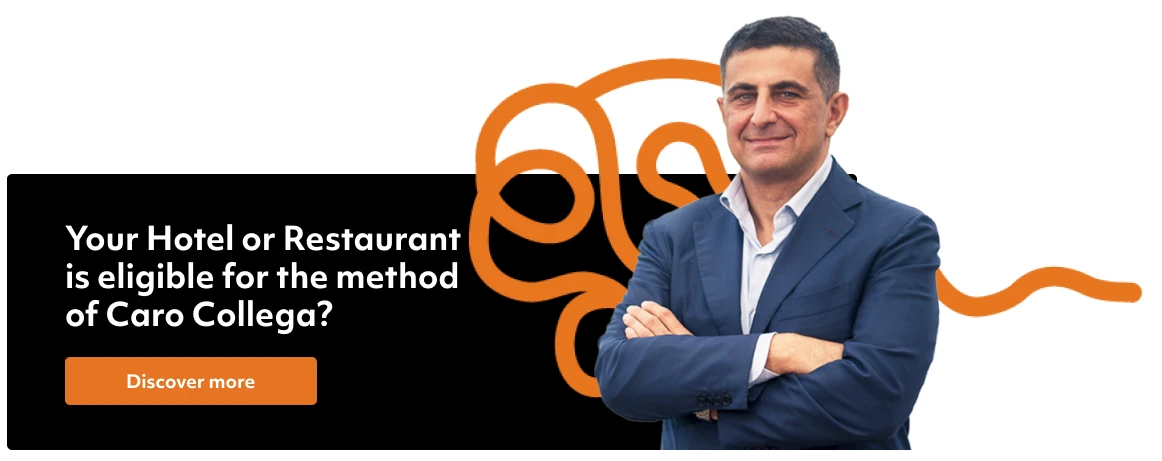During the years I was a Restaurateur and Hotelier, I used to complain that the turnover never reflected the hours I was spending to work. At that time, I was doing everything I could get my hands on: helping in the kitchen, waiter, stock boy, concierge, salesman, grocery clerk since no one could do things the way I did them.
Unfortunately, I didn’t spend much time thinking about how to adapt the business to a world that was no longer the same, convinced that word of mouth would solve all my problems. Today, considering the mistakes I made, I devote most of my time to disseminating what, together with the Caro Collega Digital Dream Team, I put into practice every day.
Teaching how it is possible to generate revenue directly attributable to digital strategies and techniques is our Mission and Hotels and Restaurants are the perimeter within which we like to move.
Among the most effective tools every marketer has at his/her disposal are Landing Pages (LP) and if you have a Hotel or Restaurant and have never developed one or more landing pages, it means you have missed an opportunity to add extra revenue to what you are normally generating.
In this article I will try to explain why landing pages are a tool your Hotel or Restaurant cannot do without. I am Giancarlo De Leonardo former Restaurateur and Hotelier, founder of Caro Collega, a community of enlightened Restaurateurs and Hoteliers whose goal is to develop extra turnovers through digital strategies and tools.
In this article
- Ingredients for a successful landing page
- Goals and types of landing pages
- Investing in paid “Traffic”
Ingredients for a successful landing page
Creating a successful landing page for a Hotel or Restaurant requires:
- A thorough analysis of the audience we want to reach (target audience) and our competitors
- A strategy, based on the analysis made
- Constant experimentation, even when we have found the ideal solution we must never stop testing
As a matter of fact, in a digital world where competition is just a click away and decisions are made in fractions of a second, having a Landing Page that converts (i.e., bringing in extra bookings) can be your big opportunity to add additional revenue over and above what you already develop in the traditional way.
But let’s get right to defining what a Landing Page is and what are the most important steps in making one. Obviously, I will try to convey to you the “gist” of the experience I have gained together with the Digital Dream Team of Caro Collega that has been working for years to teach and help so many restaurateurs and hoteliers to create their own landing pages with the aim of billing more.
A Landing Page is a web page specifically designed to guide a visitor (potential customer) to a specific action.
For example, registering for a newsletter, booking a room for an upcoming event, reserving a table at a restaurant for a special date, or any other goal you want to achieve.
Every element of this page, from the title to the design, from the content to the call to action is optimized to convert the visitor into a customer or lead (where a lead is defined as a contact who has lee a name and email or phone number).
But beware, a Landing Page is not the homepage of the website! Your own site’s homepage is the virtual entrance to your online Restaurant or Hotel and is your digital business card that serves to introduce your business to potential customers before they visit. It is not meant to convert, but it is meant to introduce itself to the visitor.
In contrast, a Landing Page has a very narrow focus and aims to guide the visitor to a single action (e.g., a booking), without distractions.
Simply put, the key difference lies in the intent. While a Homepage presents the entire universe of your brand and offers several avenues of action (generic information of various kinds), a Landing Page guides visitors toward the goal you have set, making it an essential tool for any business that wants to achieve measurable results online.
Another major difference between Homepage and Landing Page is that any paid traffic should be directed to the latter and not to the former, which is too generic.
Creating specific pages for the groups of visitors you target will help you to make your paid campaigns (Ads) perform and consequently increase conversions, and it will also be easier to measure the results of each individual marketing strategy (ad campaigns on Google, on Facebook, on Instagram, on TikTok).
Goals and types of landing pages
Once you understand what a landing page is for, it is good to understand that they can be of different types. Each Landing Page should have its own personality, design, and content, which can vary depending on the desired action and target audience.
For example, we have:
- Informational landing pages: they are a showcase that can offer all the details of one of your offerings. Maybe you are showcasing the suite you just renovated, or perhaps you want to promote a wellness weekend, or you want to advertise your Valentine’s Day dinner or New Year’s Eve dinner. These pages are dedicated solely to highlighting a particular offer inherent in your business and seeking an audience interested in it.
- Registration Landing Page (Opt-in page): this type of landing pages are used to search for new contacts, that is, people interested in leaving their information (such as name and e-mail or cell phone number) in exchange for something. It could be a voucher for a welcome drink, or membership to clubs that offer exclusive benefits, etc… This type of landing page is intended to do lead generation i.e. expand your customer data base and later generate additional profits for your business.
- Sales Landing Page (sales page): these are the most important ones since they have the main goal of converting, which for a Restaurant or Hotel is represented by the reservation. The aim? To turn a visitor into a customer, making sure that following the landing page visit there is a visit at your business. This is why in “technical” terms we talk about conversion, that is, achieving the goal for which we developed the Landing Page.
Remember: building specific landing pages allows us to reach an audience interested in your product that will generate bookings that would otherwise be difficult to achieve. Through specificity we can achieve results that we would not be able to achieve if we were focused only on generic pages on your website.
Consequently, a landing page allows you to obtain high-quality leads (potential customers): by optimizing communication for a well-defined target audience, you will be able to obtain interactions from an audience that is truly interested in what your Hotel or Restaurant offers.
Finally, you must keep in mind that Landing Pages are able to collect and provide valuable data from your visitors, data that you can leverage to refine your future marketing and especially retargeting strategies. How? Through contact (lead) analysis, which you can perform using tools such as Clarity, which allow you to understand how users behave within your pages.
Investing in paid “Traffic”
I know! Paying is a word you are as allergic to as I was when I was a Restaurateur and Hotelier. But the argument is disarmingly simple. Your potential customers are either on Google or on Facebook, Instagram, TikTok, etc., which are businesses that live off from advertising.
Once you have built a landing page you will have to channel qualified traffic to it: that means finding potential customers on one or more of these media channels who may be interested in your proposition. Basically, you will have to invest in generating advertisements that will aim to attract the attention of potential customers and bring them to the landing page with the goal of conversion (booking). At that point, measuring ROI (return on investment) will be child’s play and you can measure how much you spend per new contact or booking.
Adding extra revenue on top of what you are already developing is not difficult if you document how to do it!
Article written by Giancarlo De Leonardo, former Hotelier and Restaurateur, founder of Caro Collega

